

The Decline of British Economic Power Since 1870 - M.W. Kirby. UK Economy in the 1920s. British History, Between the Wars, After more than four years of bitter conflict the guns fell silent over Europe, an uneasy peace descended over the continent.
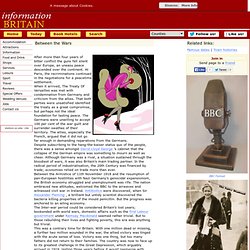
At Paris, the recriminations continued in the negotiations for a peacetime settlement. When it arrived, The Treaty Of Versailles was met with condemnation from Germany and criticism from the allies. That both parties were unsatisfied identified the treaty as a great compromise, but perhaps not the ideal foundation for lasting peace. Supporting industry: the inter-war years. The depressed conditions faced by British industry after the First World War was further exacerbated by the slump of 1929-33.
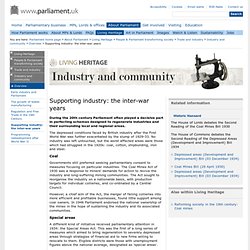
No industry was left untouched, but the worst affected areas were those which had struggled in the 1920s: coal, cotton, shipbuilding, iron and steel. Coal Governments still preferred seeking parliamentary consent to measures focusing on particular industries. The Coal Mines Act of 1930 was a response to miners' demands for action to revive the industry and long-suffering mining communities.
The Act sought to reorganise the industry on a nationwide basis, with production targets for individual collieries, and co-ordinated by a Central Council. However, a chief aim of the Act, the merger of failing collieries into more efficient and profitable businesses, found little support among coal owners. Special areas. Eml.berkeley.edu/~eichengr/research/floudjohnsonchaptersep16-03.pdf.
Oxbridge Notes the United Kindgom. This is a sample of our 17 page long Interwar Period notes, which we sell as part of the British History VII (Since 1900) Notes collection, a Distinction package written at Oxford in 2013 that contains 70 pages of notes across 4 different documents.
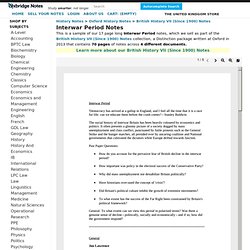
Interwar Period Revision The following is a plain text extract of the PDF sample above, taken from our British History VII (Since 1900) Notes. This text version has had its formatting removed so pay attention to its contents alone rather than its presentation. The version you download will have its original formatting intact and so will be much prettier to look at. Interwar Period 'Democracy has arrived at a gallop in England, and I feel all the time that it is a race for life: can we educate them before the crash comes?
13-1b - The Interwar Period.mov. 13-1a - The Interwar Period.mov. England In the Interwar Period. The Rise and Fall of England: 14. The Decline of England. APRIL 01, 1969 by CLARENCE B.

CARSON Dr. Carson, Professor of History at Grove City College, Pennsylvania, will be remembered for his earlier FREEMAN series, The Fateful Turn, The American Tradition, and The Flight from Reality. England’s decline began in the interwar years between World War I and World War II. To all appearances, England was still a great world power. "To think," Kaiser Wilhelm lamented at the outbreak of World War I, "that George and Nicky should have played me false!
Ramsay MacDonald. James Ramsay MacDonald, the illegitimate son of Ann Ramsay, a maidservant, was born in Lossiemouth, Morayshire, on 12th October, 1866.
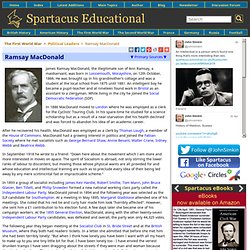
He was brought up in his grandmother's cottage and was a student at the local school from 1875 until 1881. An intelligent boy he became a pupil-teacher and at nineteen found work in Bristol as an assistant to a clergyman. While living in the city he joined the Social Democratic Federation (SDF). In 1886 MacDonald moved to London where he was employed as a clerk for the Cyclists' Touring Club. In his spare-time he studied for a science scholarship but as a result of a near-starvation diet his health declined and was forced to abandon his idea of an academic career. After he recovered his health, MacDonald was employed as a clerk by Thomas Lough, a member of the House of Commons.
In September 1918 he wrote to a friend: "Down here about the movement which I am more and more interested in moves on apace. Inter-War Period, 1919 - 1939. Detailed Timeline of European History Inter-War Period (1919 - 1939) Global Depression and Tensions Preceding World War II Go to European History Interactive Map Inter-War Interactive Map Inter-War Economy & Government for Each Country.
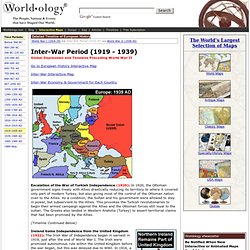
v5.books.elsevier.com/bookscat/samples/9780750684118/9780750684118.pdf. The inter-war years: 1918-1939. Louise Jermy Louise was born in Hampshire, on 30 January, 1877.
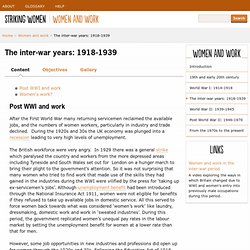
Her mother died when she was 18 months old and her father married again. Louise was taken out of school at the age of eleven to work in her stepmother’s home-based laundry business. Britain during the Inter-War Years. Leaving Cert > Dictatorship and Democracy in Europe > Britain during the Inter-War Years In Second Year, you learned how the Industrial Revolution changed England.
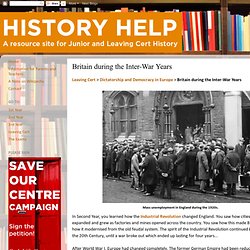
You saw how cities and urban life expanded and grew as factories and mines opened across the country. You saw how this made Britain wealthy, and how it modernised from the old feudal system. The spirit of the Industrial Revolution continued into the beginning of the 20th Century, until a war broke out which ended up lasting for four years...
After World War I, Europe had changed completely. The former German Empire had been reduced to a shell of its former self, and the Austro-Hungarian Empire had collapsed. Continue to Anglo-American Popular Culture in Peace and War Key Personalities: J.M. Higher Level (100 marks each)2011: What did one or more of the following achieve in Britain during the period 1920 - 1945: J.M. 2009: What were the main social and economic challenges facing Britain, 1920 - 1945? Links go here Links go here. Interwar unemployment and poverty in the United Kingdom. Interwar unemployment and poverty in the United Kingdom describes a period of poverty in the United Kingdom between the end of World War I in 1918 and the start of World War II in 1939.
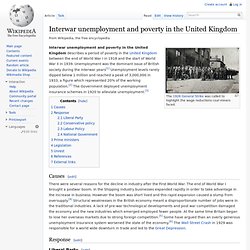
Unemployment was the dominant issue of British society during the interwar years[1] Unemployment levels rarely dipped below 1 million and reached a peak of 3,000,000 in 1933, a figure which represented 20% of the working population.[2] The Government deployed unemployment insurance schemes in 1920 to alleviate unemployment.[3] Causes[edit] The Interwar Years (1919-1938): Britain During the Inter-War Years (1919-1938) Summary The British government had a great deal of difficulty in adjusting to post-war politics.

David Lloyd George, the talentedd Liberal prime minister, was permitted to retain his office by the Conservative majority. At first he continued to run the government as he had during the war, using only his closest advisors to discuss and execute policy decisions. He often worked behind closed doors. Though he had returned from the Paris Peace Conference to general approval, things gradually began to look less rosy. Immediately after World War I, workers in many key industries began to strike, demanding higher wages, better working conditions, and shorter hours now that the war was ended. However, political stability could not be maintained.
LECTURE ON ENGLAND AND FRANCE IN THE INTERWAR PERIOD.